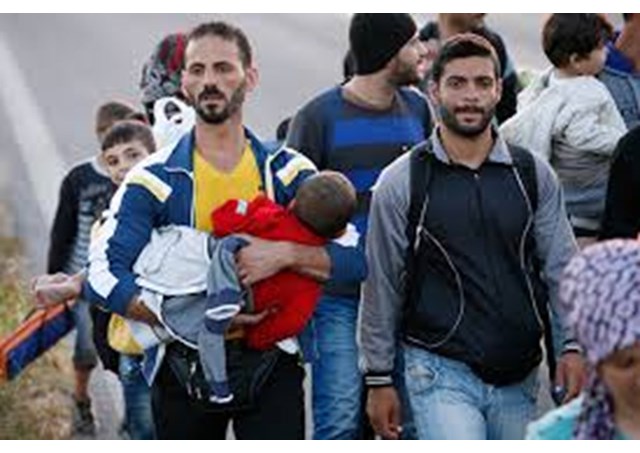
Card Tagle: I listen to the stories of refugees and ask “where is humanity?”

(Vatican Radio) Cardinal Luis Tagle, President of Caritas Internationalis, says political and economic decisions regarding the fate of refugees and migrants must not be made without taking into account our common humanity.
Speaking to Vatican Radio’s Linda Bordoni from a refugee camp in the Greek town of Idomeni close to the border with Macedonia, Cardinal Tagle said: “ I listen to the stories and I ask myself: ‘where is humanity? Why are human beings making it difficult to other human beings just to move out of an unpleasant situation to look for a better future?’”
Listen to Cardinal Tagle’s interview with Linda Bordoni:
Cardinal Tagle explains that he is in Idomeni together with a Caritas Internationalis team that has met up with the local Caritas Hellas that has been working in Greece since the beginning of the refugee and migrant crisis in Europe assisting hundreds of thousands of people fleeing conflict and poverty.
He says it a transit camp for refugees who have landed on different Greek islands and then are transported to Athens, and from Athens brought to the camp by bus where they get some food, some medical assistance, they are able to take a shower - “and they wait”.
“In groups of fifties they are brought close to the border and they walk to another camp in Macedonia where they wait for… I don’t know… for a few hours or for some days to get to a train to the next border” he says.
Cardinal Tagle says that being here and witnessing the situation one cannot but ask oneself “what has caused this human misery?”
And even if you don’t fully understand the causes – he says – the situation speaks of the horror of the experiences of these people.
“They look weary, they look tired, they look confused, they’re uncertain and you see them lining up for food and they only thing that they have is the little bag hanging on their shoulder, their clothing, their families, their babies… they have each other”.
Cardinal Tagle says he thinks that most of the people who make the dangerous journeys are well aware of the fact that they are putting their lives and the lives of their children in danger, but – he says – staying in their home countries is a much greater danger for their families.
“It is always for our families, always for our children” the refugees and migrants say.
He says the people who make the journey do so in the hands of traffickers paying thousands of euros.
Cardinal Tagle says: “I listen to the stories and I ask myself: ‘where is humanity? Why are human beings making it difficult to other human beings just to move out of an unpleasant situation to look for a better future?’”
And – he says – “as I ask that question I know that these people are very much victimized not only in their home of origin, but also by people who they meet in transit”.
He describes the transit camp as a most unpleasant place, but a place in which you see a lot of humanity: “the volunteers, those who are selflessly feeding and accompanying the refugees night and day, explaining things to them and comforting them!”
And of course, there are the families themselves.
“You see the parents caring for the children, and the children smiling so innocently, not knowing what’s happening and finding solace in the arms of their parents – it breaks your heart!” he says.
And after the camp, continuing in their journey, they come across more fences and barriers. What can we do?
Cardinal Tagle says he thinks the Pope’s appeal to the United Nations for determined international political will to address climate change must also apply to this question.
“You see how common love for our common humanity is very much needed in politics, in international, local and regional politics” he says.
“Fiscal legislation and economic policies are not enough if there is no deep sense of humanity” Tagle explains, and he expresses his hope that humanity can enter into political decision-making.
The Cardinal says that at the Synod of Bishops on the Family the predicament of the refugees and migrants is being addressed.
He notes that some people are trying to make it appear to wider world that the Synod is focused on just a couple of questions such as divorce.
He points out that while all of those are important issues to be addressed “I hope the sharing of the bishops from the Middle East, from many parts of Africa and Asia, and even the bishops from European countries who are seeing the consequences of the refugee problems, I hope they can be given a voice”.
These refugees are fleeing their countries for their families. “So conflicts, poverty and human smuggling are not exterior to the families, they hit the family at its core” he says.
Cardinal Tagle agrees the situation is becoming more and more urgent as winter sets in and says: “we hope the eyes of the world will save the family and see the ill consequences of failed politics, of failed approaches to peace, the use of arms and the lack of respect for people who differ from us in terms of culture and religions”.
“It’s the innocence of the family, he says, that is really destroyed”.
He tells of the moving image of a father gathered in prayer with his daughter in the camp and of how lovely it is to see that in a place such as this “that pristine, pure love is preserved.
Cardinal Tagle concludes: “We hope the whole world will work for peace, equality and humanity for the sake of these families”.
For more information on the work of Caritas Hellas and Cardinal Tagle's visit to
Idomeni camp click here.
| All the contents on this site are copyrighted ©. |


